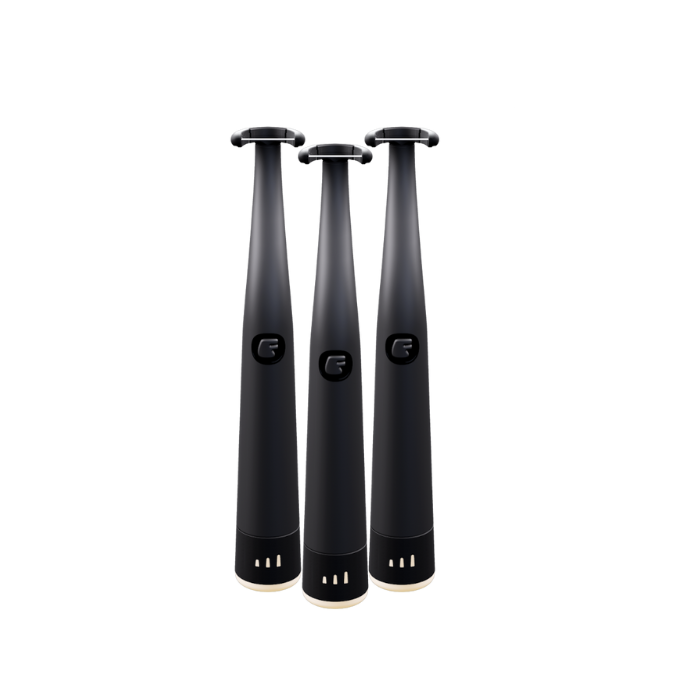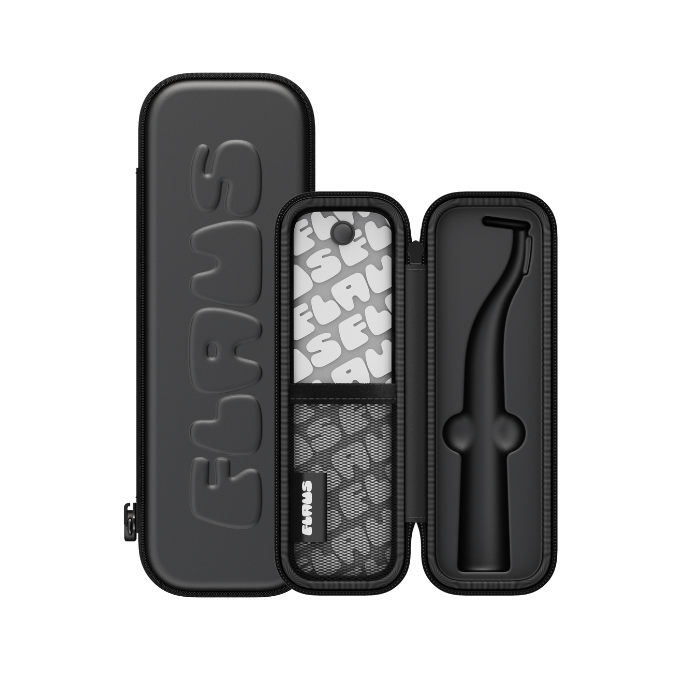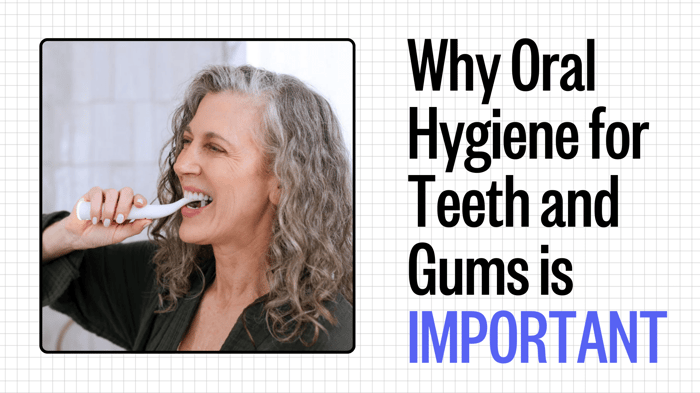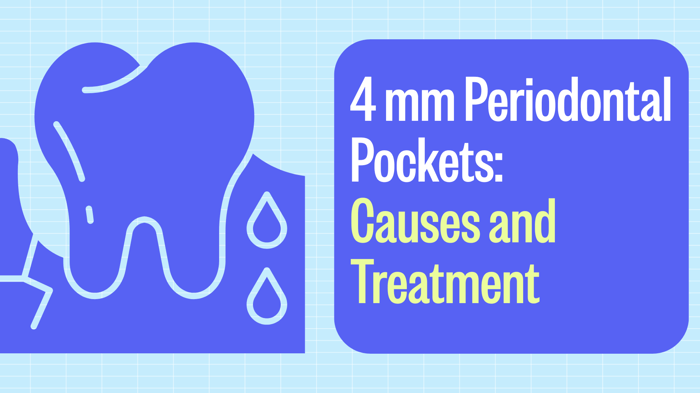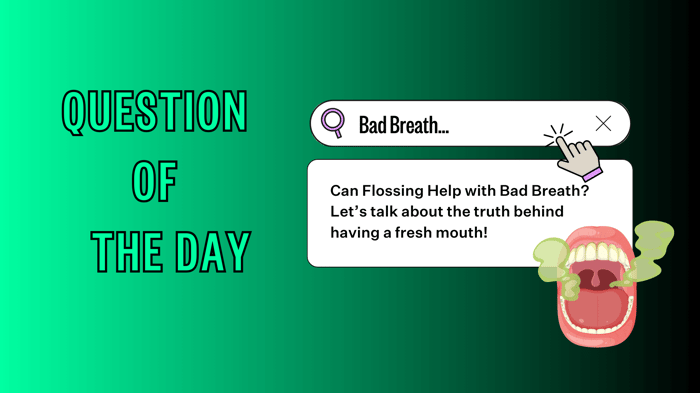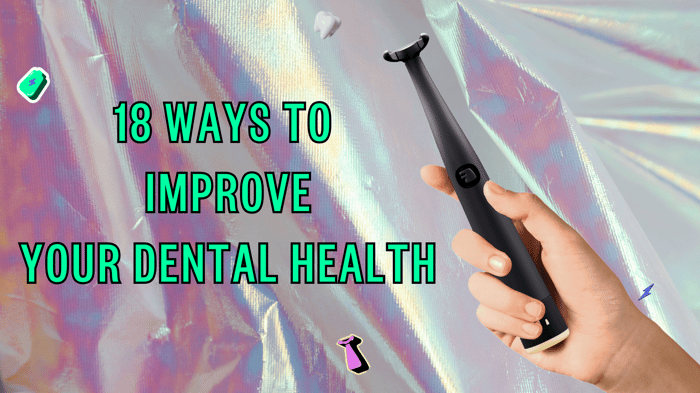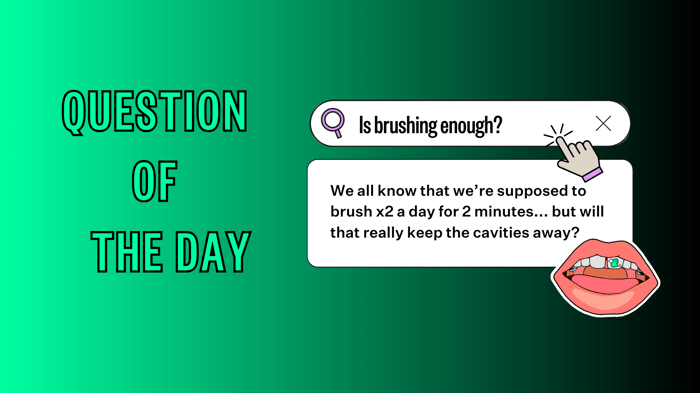Clean teeth and gums are key to a healthy mouth (and body). Oral hygiene for teeth and gums including regular brushing, flossing, and dentist visits helps prevent tooth decay and gum disease - the leading causes of pain, discomfort, and tooth loss. Ignoring oral health might turn your smile upside down with costly treatments or/and affect your overall wellness. So next time when you skip brushing before bedtime, remember it's not just about fresh breath, it's also about your well-being. Let's dive in.
Maintaining good oral hygiene for teeth and gums is crucial for overall health as it helps prevent dental problems such as cavities, gum disease, and bad breath. Furthermore, research has shown that poor oral hygiene can lead to more serious health issues like heart disease, Alzheimer's and diabetes. Regular brushing, flossing, and dental check-ups are essential for preserving not only a bright smile but also one's general health.
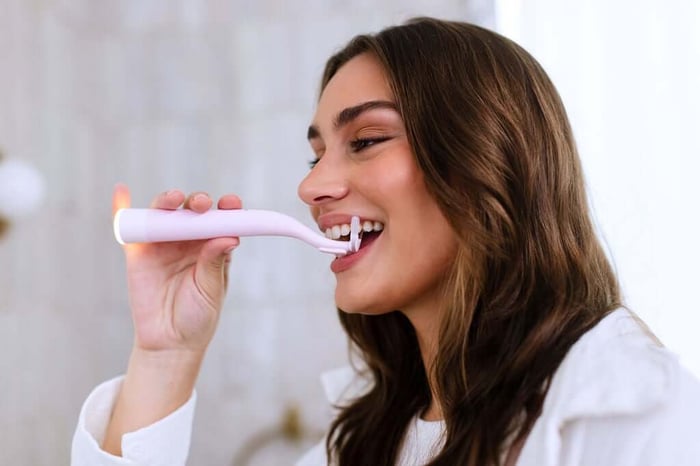
Oral Hygiene for Teeth and Gums - Why It's Really Important to our Mouth Health
When we consider oral hygiene, it's not just about preventing bad breath or maintaining pearly white teeth. It's essential for preventing painful dental conditions like tooth decay and gum disease. A consistent oral care routine plays a pivotal role in keeping our overall oral health in check.
One of the main culprits that can wreak havoc on our dental health is plaque—the sticky, colorless film of bacteria that forms on our teeth. Plaque produces acids that attack tooth enamel, leading to cavities and eventually causing tooth decay if left unchecked. Additionally, a buildup of plaque along the gumline can lead to inflammation and gum disease, resulting in red, swollen, or bleeding gums. If left untreated, it can even lead to tooth loss.
Neglecting regular brushing, flossing, and dental check-ups can have serious consequences as continuously missing out on these simple yet crucial steps in oral care can pave the way for costly dental treatments down the road.
Let's put this into perspective: imagine neglecting to brush and floss regularly resulting in the development of severe gum disease. This could lead to the need for gum surgery to repair damaged tissues and prevent further tooth loss. The pain, discomfort, and expenses associated with such treatments underscore the importance of regular oral care maintenance.
So, taking preventive measures by incorporating daily brushing, flossing, and routine dental check-ups can significantly reduce the risk of developing these oral health issues. Think of it as an investment in your overall well-being; while it might seem relatively minor compared to serious medical conditions, good oral hygiene can have a significant impact on your quality of life.
Now that we've discussed why oral hygiene matters for your teeth and gums, let's move on to explore some practical steps you can take to maintain excellent oral health in your daily life.
Techniques for Maintaining Oral Hygiene for Teeth and Gums
Taking care of your teeth and gums helps maintain a beautiful smile and help to prevent dental and overall health problems. Here are some techniques to help you do just that.
Brushing
To start, make sure to use fluoride toothpaste when you brush. This helps protects your teeth from decay. Aim to brush at least twice a day for about two minutes each time. Remember, it's not just about brushing quickly; it's about getting all surfaces on each tooth.
If using a traditional toothbrush, make gentle circles or short back-and-forth motions. Avoid scrubbing too hard as doing so can damage your gums and cause them to recede. Also, remember to clean your tongue gently. Bacteria can build up on your tongue, so giving it a good brush helps keep your breath fresh.
Flossing
Flossing every day is just as important as brushing. It reaches the spots between your teeth and below the gum line where a toothbrush can't reach. Food particles and plaque can build up in those tight spaces, leading to cavities and gum disease over time.
Flaus Electric Flosser
For those who find regular floss difficult to use, the Flaus Electric Flosser is a highly recommended tool to improve oral hygiene. This innovative flosser is designed to make flossing easier, as well as help people create the habit of flossing! In fact, 9/10 Flaus customers reporting flossing MORE after purchase.
The 18,000 sonic vibrations and long ergonomic handle allows Flaus to easily reach your back molars and get in between tight contacts - removing plaque and food particles that can be hard to reach with traditional floss. The Flaus Electric Flosser is gentle on the gums and works well for individuals of all ages, including kids (6+) and those with limited dexterity.
Regular use of the Flaus Electric Flosser can help strengthen your gums, prevent gum disease, and keep your teeth looking and feeling their best. Incorporating the Flaus Electric Flosser into your daily oral hygiene routine ensures comprehensive care for your teeth and gums, promoting a healthier, brighter smile.

Mouthwash
Using an antimicrobial mouthwash can be beneficial in reducing plaque and preventing gingivitis. It's important to note that mouthwash should not replace flossing or brushing, but should be used in addition to them for a more comprehensive oral hygiene routine.
Remember maintaining good oral health is not just about how often you do these tasks but also about doing them effectively and thoroughly each time. By incorporating proper techniques into your daily routine, you are taking proactive steps toward achieving and maintaining excellent oral health.
As we transition from the basics of maintaining good oral health, let’s now focus on specific techniques for ensuring the health of one particular area—keeping gums clean and healthy.
Keeping Gums Clean and Healthy
It's easy to forget about our gums when we brush our teeth. But they're just as important to take care of as our pearly whites. Neglecting our gums can lead to gum disease, which can cause serious health problems if left unchecked. Let's delve into some essential habits and techniques for keeping those gums in top shape.
Brushing the Gumline Gently
When it comes to brushing, many of us are focused on making sure our teeth look and feel clean. However, a huge part of maintaining healthy gums is ensuring proper cleaning of the gum line. It's best to use a soft-bristled toothbrush to avoid scratching or irritating the gum tissue while brushing. Use gentle, circular motions to cover both the teeth and the gum line.
The Importance of Gentle Brushing: By using too much force or a brush with hard bristles, you can actually damage your gums, causing them to recede or become inflamed. So, be kind to your gums!
Flossing for Healthy Gums
Flossing prevents bacteria from building up and causing gum disease.
Remember that flossing should also be done gently; snapping the floss between your teeth with too much force can hurt your gums and cause bleeding. Instead, carefully slide it down between each tooth and curve it around the base of each tooth (this is called the C-Shape Method). If you have tight contacts or struggle to get the floss between your teeth easily, the Flaus Electric Flosser might be the perfect tool for you, as the 18,000 sonic vibrations per minute, help to easily glide the floss between tight contacts.
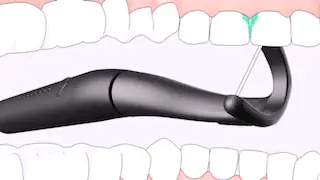
Using these two simple but essential techniques—gentle brushing of the gumline and regular flossing—you can promote excellent gum health, prevent gum disease, and contribute to your overall oral health.
With proper daily care, you're already well on your way to maintaining impeccable oral hygiene at home. Now let's explore how regular dental cleanings can further support your quest for perfect dental health.
Importance of Regular Dental Cleanings

Even the most diligent brushers and flossers might miss hard-to-reach spots where plaque and tartar can build up. These stubborn deposits can turn into real troublemakers, leading to gingivitis—early-stage gum disease—hidden under the radar as you go about your everyday life.
This is where professional dental cleanings come into play! A skilled dental hygienist has the tools and expertise to thoroughly clean your teeth, removing tartar buildup and plaque from areas that your toothbrush and floss can't reach. By doing so, they help keep your gums free from an excess of bacteria and the inflammation it causes.
Here's why this matters: Excessive levels of bacteria present in the mouth due to poor oral hygiene contribute to gum disease, which could lead to more serious health issues down the line—like heart disease, diabetes, Alzheimer's, and certain types of cancer. This might seem surprising, but it underscores how important it is to keep your gums healthy through proper cleaning.
Consider your dental cleaning as a proactive measure. It helps detect issues at an early stage when they're easier and less expensive to treat. For example, not many people are aware that sometimes early signs of oral cancer or other serious infections in gums or teeth can be found during these regular check-ups.
You see, preventive care goes beyond just maintaining a bright smile; it's essential for safeguarding your overall health as well. Addressing potential trouble spots early on can save you significant discomfort later—both physically and financially!
Let's talk about the tangible benefits of regular dental cleanings for your oral health—how they keep your breath fresh, preserve that pearly white smile, and bolster your general wellness. Diving deeper into these benefits will help us understand why scheduling those biannual appointments is indeed worth it.
Oral Health and Overall Well-being
Your mouth acts as a window into your body's general health. It might sound unusual, but observing your oral health can provide insights into the rest of your body. Imagine your mouth as a snapshot, a telling piece of evidence that highlights the interconnections between your body systems in their quest to maintain balance and health.
More research suggests that poor oral hygiene can cause bacteria from the mouth to enter the bloodstream, leading to inflammation in other parts of the body. This inflammatory response could contribute to the development of various diseases, including heart disease and diabetes. These are serious conditions, not just for our bodies but also for our peace of mind.
And think about this—the same bacteria and plaque buildup in your mouth that gives you cavities can also make its way into your bloodstream when oral health is neglected.
Let's talk about gum disease (periodontal disease) for a moment—a common problem stemming from poor oral hygiene practices. This condition has been found to have potential links to certain systemic illnesses. For instance, studies have shown that periodontal disease may be associated with an increased risk of heart disease, diabetes, respiratory infections, and even Alzheimer’s disease.
Don't believe me? Well, consider this: people who have gum disease need more medication to control their blood sugar levels than those without gum disease.
It's like a chain reaction: when one part of our body isn't working as it should, it affects other areas too. But there's good news! Taking care of your teeth and gums can lead to wonderful results—lessening risks of these conditions and ultimately contributing to your overall sense of wellness.
Investing time into caring for your oral health isn’t just about keeping your smile bright; it’s about ensuring that your entire body stays healthy. And we all want that don't we? I'm sure you do too!
With a newfound understanding of the critical link between oral health and overall well-being, let's now explore the practical tools and products that can help you step up your oral care game.
Tools and Products for Effective Oral Care
When it comes to maintaining your oral health, having the right tools and products can make all the difference. While the most basic tools you might use daily are a toothbrush and toothpaste, there are other options available that can enhance your routine and improve the overall health of your teeth and gums.
Electric Toothbrushes
Electric toothbrushes, also known as power toothbrushes, can be a game-changer in your daily oral care routine. These brushes are designed to provide more efficient plaque removal than manual brushes, making them especially beneficial for people with limited mobility or those who struggle with manual dexterity. The rotating or vibrating bristles do much of the work for you, ensuring a thorough cleaning without aggressive brushing. Additionally, many electric toothbrushes come with built-in timers, which is incredibly helpful for ensuring that you brush for the recommended two minutes. This simple tool can make a significant impact on your overall oral hygiene.
Electric Flossers
For those of us who are simply negligent flossers - we might need something that makes flossing easy and comfortable - like an electric flosser. A great alternative to traditional flossing are electric flossers, like Flaus.
Electric flossers are a great way to maintain good oral hygiene, and Flaus is a good option for those looking for an eco-friendly and effective electric flosser. Here are some reasons why using an electric flosser is a great alternative to traditional flossing:
- Easy Reach: They can reach tight spaces and molars easily due to the ergonomic handle
- Easy to use: Electric flossers are easy to use and require less manual dexterity than traditional flossing
- Comfortable: They can also be less messy and more comfortable to use than string floss, as you don't have to put your fingers in your mouth
- Encourages good habits: Many people find electric flossers more enjoyable to use than traditional floss, which can encourage them to floss more regularly
- Eco-friendly: Flaus is the world's first eco-friendly electric flosser, which can reduce waste and help protect the environment. Flaus uses 90% less floss than traditional flossing and offers a Flaus head recycling program to ensure that the floss heads are properly recycled at a dedicated oral care recycling facility.
Some of the features that Flaus has include:
- Sonic vibrations: At 18,000 sonic vibrations/min, Flaus moves quickly and easily between tight teeth to massage gums and remove plaque and debris from tight spaces your toothbrush can’t reach.
- Ergonomic Soft Touch Handle: With a design that feels as familiar as your favorite electric toothbrush, Flaus′ premium, ergonomic soft-touch handle gives you full control over hard-to-reach places while keeping your fingers (and the 10 million bacteria that live on them) out of your mouth.
- Waterproof: Whether you are flossing on the go or multi-tasking in the shower, Flaus is waterproof and has you covered.
- High Performing Floss Heads: Floss heads are fitted with high performing glide floss strong enough for the tightest of teeth, made with recyclable plastic and use 30% less plastic than traditional floss picks. You can also recycle your Flaus heads through a Floss Head recycling program where the floss heads are sent to be recycled in a dedicated oral care recycling facility.
- Two Month Battery Life: The rechargeable flosser has a two month battery life and comes with a charging base and USB cable to boot.
- Dentist Designed and Recommended: Flaus was designed with dental experts from day one to ensure the very best clean.
Overall, electric flossers, like Flaus, can be a great way to maintain good oral hygiene and develop / encourage good habits. They are effective, easy to use, and eco-friendly, making them a good option for those looking for an alternative to traditional flossing.
How Dietary Habits Affect Dental Health
Your diet isn't just crucial for your body; it's vital for your teeth and gums too. While most people know that sugar is bad for teeth, understanding why dietary choices matter in maintaining good oral health is important.
Consuming foods high in sugar and acids can lead to problems like cavities and enamel erosion. These substances weaken the protective layer of your teeth, creating a breeding ground for harmful bacteria. It's like an army of tiny invaders attacking your teeth from every delicious bite or sip you take – not fun at all!
The Sugar Dilemma
Sugar is a big culprit when it comes to dental issues. Bacteria in your mouth love to feed on sugary leftovers from the food and drinks you consume. These bacteria produce acids that eat away at the enamel of your teeth, leading to cavities. It’s like a sneak attack happening in your mouth, causing damage that can be hard to fix once it takes root.
But don't worry; this doesn't mean you have to give up sugar entirely - moderation is the key here, just like with so many other things in life.
The Role of Balanced Nutrition
On the flip side, a diet rich in essential nutrients does wonders for your dental health. Foods like fruits, vegetables, dairy products, and lean proteins provide vitamins and minerals that strengthen teeth and gums. Calcium helps build strong bones (including those in your mouth), while vitamin C helps maintain healthy gums and vitamin D aids with calcium absorption.
Consuming these nutrients regularly goes a long way toward keeping your smile healthy and bright. It's like giving your teeth and gums a little extra armor to defend against any potential threats – kind of like giving them their own little superheroes to protect them from harm.
Just as important as what we eat is how we balance our intake of various foods throughout the day. The frequency of eating can play a crucial role in oral health as well. When we graze on snacks or sip on sweet drinks throughout the day, we expose our teeth to sugary or acidic attacks more frequently, giving bacteria more time to do their dirty work, increasing the likelihood of tooth decay.
The Magic Elixir: Water
Lastly, regular water intake plays a vital role in maintaining good oral health by washing away food particles and stimulating saliva production. Saliva acts as a natural cleanser that washes away food particles and neutralizes harmful acids. Staying hydrated ensures that saliva production is at its peak efficiency, working actively around the clock to keep your mouth healthy and clean.
So remember, drinking water regularly is like giving your mouth a mini spa treatment throughout the day!
Taking care of your dental health with mindful dietary habits can pave the way for a healthy smile that lasts a lifetime. If you're looking for ways to make your oral care routine even easier, consider exploring Flaus Starter Kit .
How can a lack of proper oral hygiene impact self-confidence and social interactions?
A lack of proper oral hygiene can significantly impact self-confidence and social interactions. Bad breath, stained teeth, and visible dental problems can lead to embarrassment and self-consciousness, causing individuals to avoid social situations or feel uncomfortable when interacting with others. According to a study conducted by the American Dental Association, 86% of participants reported that bad breath affects their confidence, while 75% believed that it negatively impacted their ability to have successful social interactions. Taking care of oral health not only helps maintain a healthy smile but also boosts self-esteem, leading to more positive social interactions.
What are some common practices for maintaining good oral hygiene?
Some common practices for maintaining good oral hygiene include brushing your teeth at least twice a day, flossing daily, using mouthwash, and visiting the dentist regularly for check-ups and cleanings. Brushing for two minutes helps remove plaque and prevent tooth decay, while flossing between teeth removes food particles and reduces the risk of gum disease. Mouthwash can further freshen breath and kill bacteria. Regular dental visits allow professionals to detect and treat any oral health issues early on. According to the World Health Organization, about 60-90% of schoolchildren worldwide have dental cavities, showing the importance of maintaining good oral hygiene practices.
How does oral hygiene affect overall health?
Proper oral hygiene greatly influences overall health. Research shows that poor oral care is linked to various health issues such as gum disease, cardiovascular disease, diabetes, respiratory infections, and even low birth weight in infants. The mouth serves as a gateway to the body, and maintaining good oral health can prevent the entry of harmful bacteria and reduce systemic inflammation. Regular brushing, flossing, and dental check-ups are essential habits for maintaining a healthy mouth and safeguarding overall well-being.
What are the consequences of poor oral hygiene?
Poor oral hygiene can have serious consequences for your teeth and gums. Neglecting to brush and floss regularly can lead to tooth decay, gum disease, bad breath, and tooth loss. According to the World Health Organization, approximately 60-90% of schoolchildren worldwide have tooth decay, and nearly 100% of adults have experienced dental cavities at some point in their lives. Additionally, gum disease affects around 20-50% of the global population, causing inflammation, bleeding gums, and even potential systemic health issues like heart disease and diabetes. Taking care of your oral health is crucial for overall well-being.
Are there any specific tips or techniques for improving oral hygiene?
Absolutely! Here are a few quick tips for improving oral hygiene: 1) Brush your teeth twice a day for two minutes using fluoride toothpaste; 2) Floss daily to remove plaque and food particles from between your teeth; 3) Limit sugary foods and drinks that can contribute to tooth decay; 4) Visit your dentist regularly for check-ups and professional cleanings. Studies have shown that these practices significantly reduce the risk of dental diseases, like cavities and gum disease, improving overall oral health.








